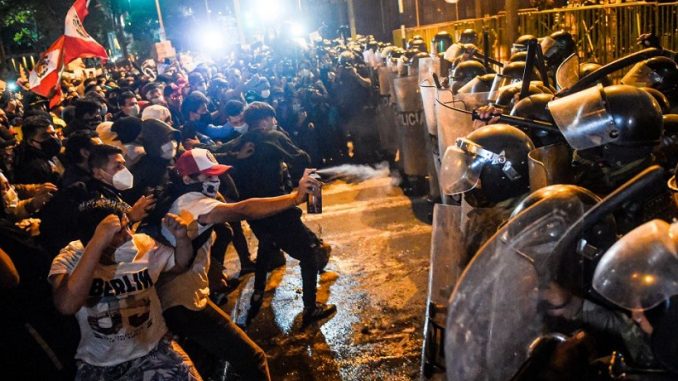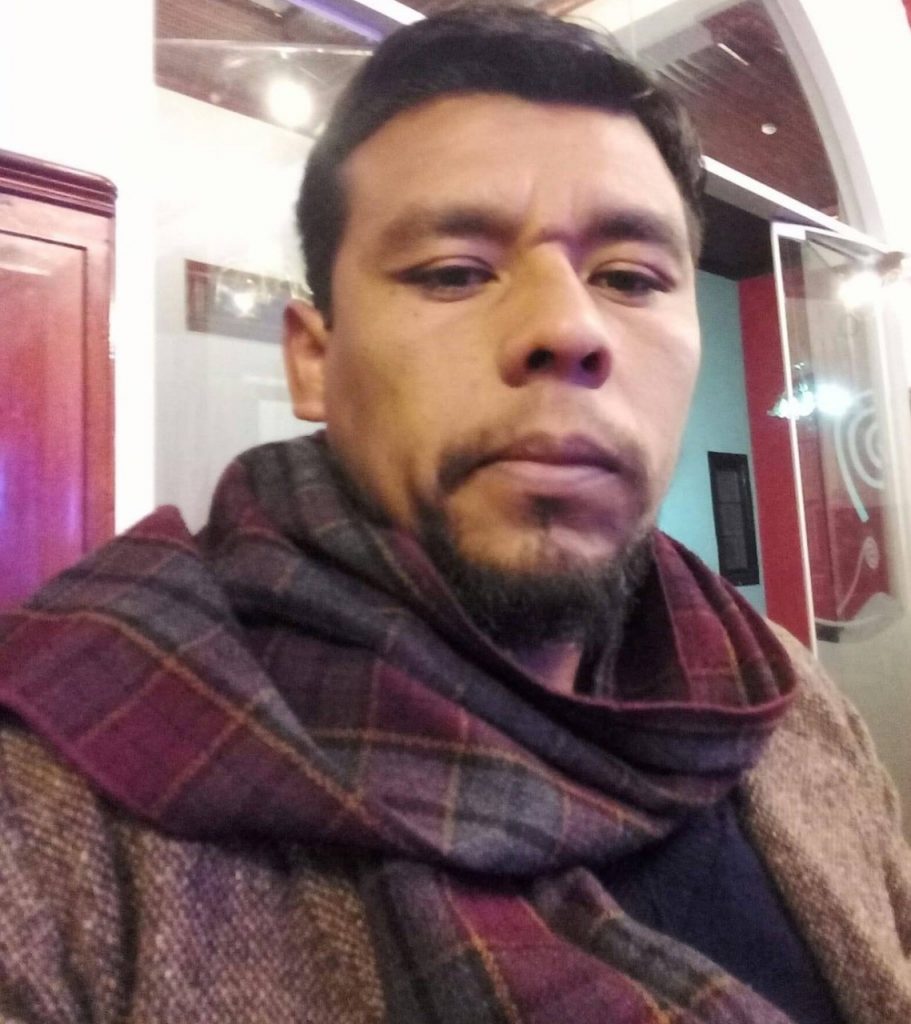
This is an interview with Flor Nolasco Pantoja, Coordinator of the Committee for the Victory of the MNP (Lima) and Toribio Durand, political analyst and militant of the Southern Region of the MNP, who participated in International Panorama, the program of the International Socialist League.
Tell us about the political situation in Lima.

Flor: Well, comrades, Lima, as a result of the different mobilizations, has reached a high level of politicization, managing to mobilize the youth, university students, and all popular sectors, confronting the neo-liberal policies of the right, the ultra-right, and the center, by shattering them and their conspiracy with the CONFIEP and the media, which are not betting on structural changes in favor of the ordinary citizens. Now a strong degree of popular resistance is present in the city of Lima, a climate of insurgency and rising with the constituent assembly as the main flag. Today, November 16, the board of directors of the Congress was elected surpassing 62 votes, headed by Francisco Sagasti of the purple party that represents the interests of the ultra-right, privatizers and colloquists, and that at the same time became the recomposition of neoliberalism in our country.
What led to the resignation of Merino and this crisis in Peru?

Toribio: This crisis in Peru has dragged on for years in addition to the capitalist crisis that is also creating certain internal contradictions, a certain crack in the model. We also see that the issue of Odebrech’s corruption is accumulating. The Fujimorista party, the Aprista party, the same ollantism “with the program of the great transformation”, ended up negotiating for a road map and co-governing with the neo-liberal right. There were already several antecedents in that framework with the PPK government that was elected that is also proven to be corrupt and left office after one year and 8 months of government. PPK is left without a seat and Vizcarra steps up as its political son. A new government is formed, one of recomposition of the right-wing. We see that this crisis was practically nonsense: Merino in a new government in the framework of January 26, which is a Fujimori and lobbyist Congress that calls for an extraordinary election. A Congress that was practically closed with the mobilizations in the streets shouting “Congress out!”
The struggle is taking place as a result of an accumulation of actions and social conflicts which the right-wing itself is generating, and a dispute between the right-wing over who is the new representative of neo-liberalism, whether it is Merino or the Congress. But the people were no longer happy, there was a very big discontent. And in that framework, Merino’s resignation was generated as a result of various events accumulated in this whole social process.
The mobilizations are huge: is this process national? What role is the youth playing?
Toribio: We see that people continue to mobilize in the streets, we are still in the streets throughout the south, from Tacna, Moquegua, Arequipa, Puno, Cuzco. The mobilizations in our country are very massive and large. It has been years since we have seen this type of mobilization. The university youth sector, workers, housewives, young workers, and the population have taken to the streets to mobilize to respond to the neo-liberal government. They are fed up with this model that has not solved and has not reformed anything that the people want. Our education is failing, housing too, the people have no place to live. We have a poor health sector, labor sector, and a very poor economy. This government was elected because the crisis is deepening, but instead of balancing, it is worsening, leading to a collapse. We can see that the people are still mobilized, still in the streets.
The youth have played an important role in the fall of the neoliberal Merino government. They have raised the slogan “New Constitution, Constituent Assembly”. I believe that we have a politicized youth that wants to transform the country’s structures. It no longer wants changes in form, but in substance, changes that will reverse the situation in our country. The youth has played an extraordinary role, it is still in the streets mobilizing itself. The elections of April 11 are coming and it is not going to end there, because the people are going to look for changes, mobilizing themselves, agitating, raising the people and putting their backs to the right, telling them that they no longer represent us, that we want a new country and to re-found a new homeland on the way to the bicentenary.
The youth have played an important role in the fall of the Merino government, the neoliberal government. They have raised the slogan “New Constitution, Constituent Assembly”. I believe that we have a politicized youth, who want to transform the country from the structures. It no longer wants changes in form, but in substance, changes that will reverse the situation in our country. The youth has played an extraordinary role, it is still in the streets mobilizing itself. The elections of April 11 are coming and it is not going to end there, because the people are going to look for changes, mobilizing themselves, agitating the people, raising the people and putting their backs to the right, telling them that they no longer represent us and we want a new country and to re-found a new homeland on the way to the bicentenary.
Is the repudiation of the old policy widespread, and in which social sector does it has more influence?
Flor: The entire Peruvian population repudiates the old neoliberal policy of the 1993 constitution of Fujimori, under which different governments have governed and served to sustain the model and institutionalized corruption, leading to the failure of health prevention, and the collapse of the public health system. This is in addition to the great deficiencies of other sectors such as education, housing, labor stability, agriculture, etc. The mobilization is focused on the youth and popular sectors, with massive demonstrations in the city of Lima.
How will the situation continue from the capital of the country in the next few days?
Flor: taking into account the results of the congress, the right-wing trusted that it could calm the population in the streets, but the population came out forcefully and massively to mobilize. And so we demonstrated that we don’t want to make up for the neoliberal model, but we do demand changes to the constitution to refound Peru. Continuing the national day of struggle together with the CGTP, we will mobilize in defense of work, health and life, and for popular democracy and the constituent assembly. We workers are called upon to be part of this struggle by resisting until the right-wing and neoliberalism fall.
What is the most likely perspective? Where is the situation going?
Toribio: The people are still in the streets, they are asking for fundamental changes, structural changes, a new constitution, a constituent assembly. We see that this government elected by the congress, which is a government of recomposition of the right, is not going to live up to the demands of the population. Let us take into account that in the capital two young people have died and there are people missing. We see a repressive government that is trying to make the protest, which is a right of our country, disappear.
In the face of all these events the strategic factor is missing. We see a mobilized left, but that is not disputing the leadership. In the face of a right-wing that is divided and disputing among itself, something strategic has to be born. Why? Because the population is looking for big answers to big conflicts.
A while ago the new president said that he will not call a referendum and there will be no Constituent Assembly. In other words, he is going to govern with the 1993 constitution in this transition government. So there is no willingness to change on the part of the right-wing, which is hardly breathing because the elections are coming up in 2021 and the municipal and regional elections in 2022.
We are involved in a process of mobilizations and at the same time an electoral process. So the people are going to continue mobilizing, and they are going to continue looking for alternatives for a solution to this crisis that is still a long way off. Then we have to begin to build that strategic factor that will allow us to make a massive, programmatic, political and strategic leap forward in our country.
We saw that the slogans “Out with all of them” and “New Constitution” are gaining strength. What policy do we revolutionaries have to raise in Peru?
Toribio: The population has discovered something, that the only way to be able to change this corrupt model, institutionalized in the different branches of government, is the new constitution. The slogan is gaining more force, something that in Lima we never thought would be shouted, that a constituent assembly would be harangued. Now not only does the south of the country cry it out, which is the red south of the country, but now Lima cries it out, everything on a national level cries out for a New Constitution. I believe that this is the way. Apart from the fact that these two slogans are gaining strength, they are becoming an action that is already confrontational with the neo-liberal model.
Now, what policy do we revolutionaries have in Peru? Within this framework we have begun to work more strategically. We have to strengthen these spaces of mobilization, to be able to continue building with a process of recruitment. We need a much more assertive and much more strategic dialogue in an international framework that allows us to strengthen the work here in Peru.
We see that there is a problem of leadership here, a problem of organization. We see a problem on the left, because they see everything as tactical and electoral, they are never going to make the strategic issue a reality because the people who are mobilizing now that we are in the streets, see that strategy is the right thing, that’s why they are asking for fundamental changes. And the new constitution is just that.
We consider that this communication must be established to make a 360º turn and talk about the strategic framework to build this organization. We have great failures in Peru with respect to the left, but we have great opportunities within the framework of the Peruvian left.
Mistakes have been made on the left, but I believe that we can begin to build the revolutionary organization that we want so much. There is a very big step, the left has responded very well, it has mobilized, it has participated in the mobilizations, it has articulated. It has come out very well, shaping itself as an option for 2021. I think we are on the right track, but we, within the framework of a much more long-term project, have been articulating to be able to shape ourselves in Lima as we have already done in other regions. Now is the time to continue working.
The policy of the revolutionaries is to be able to build a strategic power that has leadership, organization and a program, and in that framework to try to begin to work sectionally, territorially in all the sectors. This is what is lacking here and this is what we should do from an international perspective that has a clear reading of what is happening here and what has happened in Chile or what has happened in Bolivia in the last elections with MAS. We have to start now, because if not these marches are going to be wasted as you can see now. The streets and the mobilizations have expressed that we have to go to the social movements, neighborhoods, collectives, by trying to unify criteria, we can unify various social sectors.
Are there opportunities to build a revolutionary organization in Peru?
Flor: Of course there are, comrade, and we are in the moment to position ourselves. Being objective, it is clear that there are conditions and great opportunities to build revolutionary organization, taking into account organization, leadership, and a program in the strategic and tactical framework in construction; considering that it is important and fundamental to confront and banish the right and capitalism that bets on the traditional right-wing and ultra-right-wing parties and institutionalized corruption. And so we will capitalize on the great social discontent by transforming it into an alternative for strategic change.
A message for ISL militants
Flor: Socialist comrades, fraternal greetings from Peru. In the framework of this struggle in Peru, we can draw great lessons. The communication, coordination and international organization of the ISL is important because we have to continue building in these struggles that the people are leading to confront the model. I call on all the political forces of the left that make up the ISL to continue strengthening the organizational ties of the people’s struggle. Thank you very much, comrades.
Toribio: I believe that this conflict in our country is in a conflicting situation and a terminal crisis of neoliberalism. The social movement, the youth movement, has begun to take the streets by storm and to seek democracy in another way, in a way that we have always raised. It is in the marches and mobilizations that revolutionary organizations must be built, and there we must be, and there we are.
I call on all the forces that make up the International Socialist League in which we can unite, we can unify, and in that framework we can rearm even more our strategy and our tactics against these nefarious governments, against this neo-liberal model, but at the same time seek unity and strengthen the collective criteria that unify us.
Latin America has to be transformed by these mobilizations, but there’s something important, we have to begin to grow, to strengthen ourselves, to unify ourselves in the framework of the brotherhood of communication, which can transform a project in Latin America and strengthen each country. I think that now is the time, a new constitution was raised here in Peru, Chile approved its plebiscite, a great victory against capitalism, in Bolivia MAS won, we can see that there is an interesting turn that is taking place in Latin America. Now the ISL must play a strategic role here in the country and in the whole region that is going to give us a joint sense to continue building a great revolutionary project that we want for all of Latin America.
In Peru we have a neo-liberal government that has negotiated a new division, they are looking for the best person to reconstruct, they thought of Merino, Merino did not work, they gave him a coup d’état. Before they had Vizcarra, Vizcarra held out as long as he held out, they did not want Vizcarra either. They are looking for who can represent the model of our country, who guarantees that the model can survive. Right now we see that there is no one, they ran out of representatives, a representative who could be given was Roció Silva who was from the Frente Amplio, she was denied in the first vote, we see now that Francisco Segátis, who is from the party of the Morados, enters as the new representative, we see that the media has accepted him as the good candidate who is going to solve the problem of the crisis.They want to get back on track for the 2021 elections, but the population will continue to mobilize, to pay attention to the whole process, they will not be observers, but will be in the streets, organizing themselves, directing the process for a new constitution, so this is even more important. Within this framework, we need to address that the strategy plays an important role, and we in Peru have been working precisely on that and we want to work on an international level, to have a much broader approach towards Peru, as we have been discussing with several comrades.








